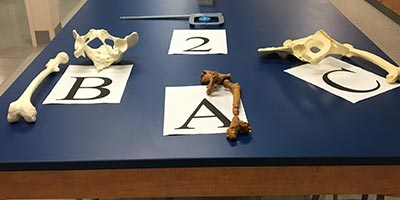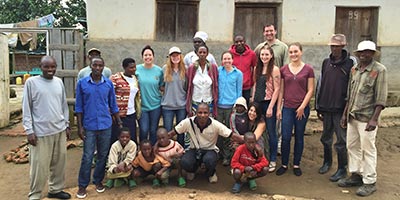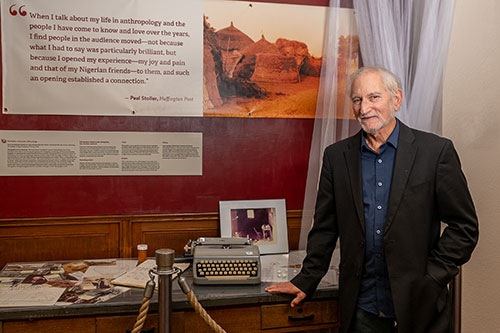
Anthropology
Anthropology is the holistic study of humankind in all of its diversity. American anthropology consists of four overlapping fields: Biological anthropology examines human biological variation and its evolution over time; socio-cultural anthropology focuses on the ways in which a group’s patterns of ideas, beliefs, norms, values, and worldviews (what anthropologists define as “culture”) inform their behavior; archaeology utilizes the environmental and historic records (artifacts, ecofacts, documents) to better understand the human past; and, linguistic anthropology focuses on the bio-cultural aspects of language and communication.
Our program explores the fascinating world of what makes us human and introduces the exciting practice of being an anthropologist. We prepare students equally for graduate education in the social sciences and for a range of careers for which understanding and negotiating cultural diversity is key—from medicine to law, and from business to consulting. Most importantly, our program is dedicated to producing well-rounded graduates who are ready to participate in an increasingly global society.
Faculty expertise spans the globe and encompasses health and nutrition research; archaeology, tourism, and museums; human and non-human primates; sustainable food systems; early Native American societies; urban life; and documentary film-making. Through coursework, research experiences, field schools, study abroad, and career-focused internships, faculty engage with students to explore timely issues such as health inequalities, cultural heritage preservation, climate change impacts, conservation and sustainability, and the cultural meanings invested in monuments and landscapes.
Announcements
Anthropology for Today's World
Addressing social inequality in race, ethnicity, class and gender has been, and continues
to be, central to the mission of anthropology. Currently anthropologists have publicly
spoken on the powerful legacies of race in America, the current immigration crisis
on our borders, how different peoples are affected by the COVID-19 pandemic, human
rights abuses, and unequal treatment in policing.
Biological Anthropology
 Biological Anthropololgy studies human biological variation and is grounded in evolutionary
theory and genetics. Major areas of study include primatology (non-human primate
studies), paleoanthropology (the fossil and genetic record of human evolution), and
human biology (the biological variation among living human populations, including
physical variation, health, nutrition, reproduction, and child growth and development).
Our faculty are well-versed in all of these major areas and provide hands-on experiences
for students in the classroom and field. Current field projects include studies of
gorillas at the Philadelphia Zoo and of chimpanzees and golden monkeys inhabiting
a national park in Rwanda.
Biological Anthropololgy studies human biological variation and is grounded in evolutionary
theory and genetics. Major areas of study include primatology (non-human primate
studies), paleoanthropology (the fossil and genetic record of human evolution), and
human biology (the biological variation among living human populations, including
physical variation, health, nutrition, reproduction, and child growth and development).
Our faculty are well-versed in all of these major areas and provide hands-on experiences
for students in the classroom and field. Current field projects include studies of
gorillas at the Philadelphia Zoo and of chimpanzees and golden monkeys inhabiting
a national park in Rwanda.
Socio-Cultural Anthropology
 Socio-cultural anthropology is the study of human culture—the different ways in which
people see, value, and act in the world. Our faculty study a range of human activities,
from political action in Latin America to African shamanism, from UNESCO’s World Heritage
program in Southeast Asia to religious movements in Europe and North America. Study
abroad and collaborative research opportunities abound for our majors. Our introductory
courses, culture cluster classes, and upper level seminars prepare West Chester University
students—majors, minors, and others—to be informed, thoughtful, global citizens.
Socio-cultural anthropology is the study of human culture—the different ways in which
people see, value, and act in the world. Our faculty study a range of human activities,
from political action in Latin America to African shamanism, from UNESCO’s World Heritage
program in Southeast Asia to religious movements in Europe and North America. Study
abroad and collaborative research opportunities abound for our majors. Our introductory
courses, culture cluster classes, and upper level seminars prepare West Chester University
students—majors, minors, and others—to be informed, thoughtful, global citizens.
Archaeology
 Archaeology is the study of past human cultures through the material remains they
have left behind and evidence of how they have modified their environment. Archaeologists
study everything from stone tools to DNA to religious beliefs. Archaeologists piece
together these clues to reconstruct all aspects of past culture, from the daily lives
of ordinary people to the opulence of rulers and priests. While archaeologists still
retrieve most of their evidence through excavation, they also utilize cutting edge
technologies such as satellite imagery, computer modeling, drones and ground penetrating
radar. Archaeologists work in the private sector as consultants in the cultural resources
management (CRM) industry, and in the public sector for government agencies, parks,
and heritage sites. West Chester University’s anthropology program instills an appreciation
for our shared human heritage, engages students in authentic field and laboratory
studies, and prepares students for ‘a future in the past’. Our students have the
opportunity to gain real world experiences through internships, labwork, field schools,
and through community engagement projects.
Archaeology is the study of past human cultures through the material remains they
have left behind and evidence of how they have modified their environment. Archaeologists
study everything from stone tools to DNA to religious beliefs. Archaeologists piece
together these clues to reconstruct all aspects of past culture, from the daily lives
of ordinary people to the opulence of rulers and priests. While archaeologists still
retrieve most of their evidence through excavation, they also utilize cutting edge
technologies such as satellite imagery, computer modeling, drones and ground penetrating
radar. Archaeologists work in the private sector as consultants in the cultural resources
management (CRM) industry, and in the public sector for government agencies, parks,
and heritage sites. West Chester University’s anthropology program instills an appreciation
for our shared human heritage, engages students in authentic field and laboratory
studies, and prepares students for ‘a future in the past’. Our students have the
opportunity to gain real world experiences through internships, labwork, field schools,
and through community engagement projects.
Community Engaged Archaeology projects are a hallmark of the program. Partnerships have been undertaken with:
- the Newlin Grist Mill
- the Westtown Township Historical Commission
- the Brandywine Conservancy
- ChesLen Preserve
- Chester County Parks
Indigenous Studies
Native American and Indigenous Studies explores the diversity of Indigenous histories, identifies ongoing Indigenous issues including struggles over sovereignty and land rights, recognizes Indigenous knowledge, and advocates for the rights of Indigenous peoples.
For more than five decades, the Anthropology program has offered an engaging curriculum aimed at developing an authentic understanding of historically marginalizing practices and the legacies of structural inequality that Indigenous populations confront it today's world. The curriculum challenges us delve deeply into widely held stereotypes and pre-conceptions regarding Indigenous peoples, particularly Native Americans.
Courses explicitly apply a cultural lens to the significance of cultural landscapes in cosmology, lands rights issues, and environmental concerns; the historical and current tensions over sovereignty and recognition; and ongoing concerns regarding the ‘ownership,’ handling and interpretation of Indigenous and Native American cultural heritage. Students may concentrate in Native American Studies through the Ethnic Studies minor.
Museum Studies Minor
The “culture sector”—museums, arts, preservation and creative industries—is experiencing worldwide growth, and our department is committed to preparing a new generation of highly skilled applied anthropologists for cultural and museological positions in the non-profit and for-profit sectors. This includes jobs in curation, historic preservation, fine arts management, visitor studies, consulting, and non-profit/NGO work. Combining archaeology and socio-cultural anthropology, and collaborating broadly across West Chester University, the Museum Studies Minor offers a hands-on approach to learning that draws on the rich array of the area’s resources, and provides internships and opportunities to work with the exhibits and collections in the WCU Museum of Anthropology and Archaeology.
Student Organizations
Lambda Alpha Nu is the WCU chapter of the National Anthropology Honor Society. It is a service organization that organizes outreach programs, and has been recognized with the WCU Ramdon Excellence Award for organizing and implementing “Layers for Liberia,” a clothing drive to aid Liberians forced to destroy their belongings due to the Ebola outbreak. View the Current Students page for more information.
The Anthropology Club is a social group that organizes student events, such as museum trips, a film series, guest lectures, and restaurant outings. Membership is open to any WCU student.
Alumni
Our alumni have gone on to careers in archaeology, historic preservation, museums, education, finance, public administration, archives, public health, medical research, and non-profit work. They have also done graduate work at the University of Kansas, Temple University, Colorado State University, the University of South Florida, New Mexico State University, Arcadia University, the University of Texas, among other US institutions, and abroad in the United Kingdom at Edinburgh University, Aberystwsth University, and Newcastle University. See our alumni profiles page.


